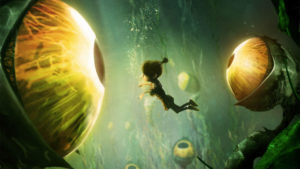You have no items in your cart. Want to get some nice things?
Go shopping “Sometimes I’d tell my mother stories about little things, like skimming rocks across the river or catching fireflies in the mulberry fields and when I told those stories I could see her eyes were mostly clear. I could tell she saw me. Really saw me. I could see her too. Her real self. Her spirit. Trying to find its way out. It was beautiful.”
“Sometimes I’d tell my mother stories about little things, like skimming rocks across the river or catching fireflies in the mulberry fields and when I told those stories I could see her eyes were mostly clear. I could tell she saw me. Really saw me. I could see her too. Her real self. Her spirit. Trying to find its way out. It was beautiful.”
This is Kubo, a one-eyed young storyteller, talking with Monkey and Beetle on a boat of leaves, having gone on a quest to find his father’s armour and defeat his twisted aunts. Kubo and the Two Strings is partly a story of family (quite a dysfunctional family) as Kubo’s journey is to understand who his parents were and are, whilst fighting the great threat his grandfather and aunt’s pose against him. Kubo is young, resourceful, resilient and strong.
This strength, I would argue, comes from Kubo’s gift of storytelling. Kubo plays the shamisen and with it the small origami papers in his backpack come to life, as birds, insects, monkeys and knights. Kubo smiles and laughs as he strums the strings and tells one of many stories. He is most himself when he is creating and telling them. He’s essentially a beat poet with a banjo. But what Kubo represents is the power of telling stories.
There are two dynamics to Kubo’s use of song and words, the first is that he is keeping his father and mother’s memories alive, having lost them (he never knew his father and his mother was killed by his aunts), the other is fictional, Kubo tells stories about “mighty warriors seeking revenge with battles and monsters and magic” as a means of escaping through his imagination. The film becomes an ode to storytelling with Kubo’s free-spirit, with the ability to transform darkness into art and beauty. Yet Kubo’s journey sends him to darker waters and it becomes a journey of family discovery. His mother has been reincarnated as the very monkey he woke up to, his father is the amnesia samurai who is forced to live as a beetle. And his aunts and grandfather want to take his other eye. When Kubo’s parents die in their reincarnated form, Kubo is able to defeat his grandfather with the memories of his parents – for memories are the strongest kind of magic.
By knowing his parents – by seeing their real selves, their spirits – Kubo is able to be with his parents again through his memory. Memories are stories and storytelling is freedom. Before Kubo defeats his grandfather, he announces a proclamation of sorts: “These are the memories of those we’ve have loved and lost. And if we hold their stories, deep in our hearts…then you will never be taken them away from us.”
Kubo ends tragically and honestly. Kubo has lost his parents twice and he goes to the lake to light two lanterns. I had a glimmer of hope at the end that Kubo’s parents would fully come back to life through the illuminated lamps. Instead, Kubo stared at me, standing beside the memory forms of his parents, for that is the truth and honesty that makes this film important and unique – that when people die the only way to keep them alive is by sharing the memories and telling the stories.

About Thomas Stewart
Thomas Stewart's fiction, essays and poems have been featured in The Cadaverine, Ink, Sweat and Tears, The Stockholm Review, Agenda Broadsheet, Flight Journal, The Fat Damsel, Lies, Dreaming, Anomaly, among others. His debut poetry pamphlet, 'Creation' is forthcoming by Red Squirrel Press. He has an MA in Writing from Warwick and a BA in English from South Wales. He enjoys folk music and is afraid of the dark. He can be found on Twitter at ThomasStewart08.




